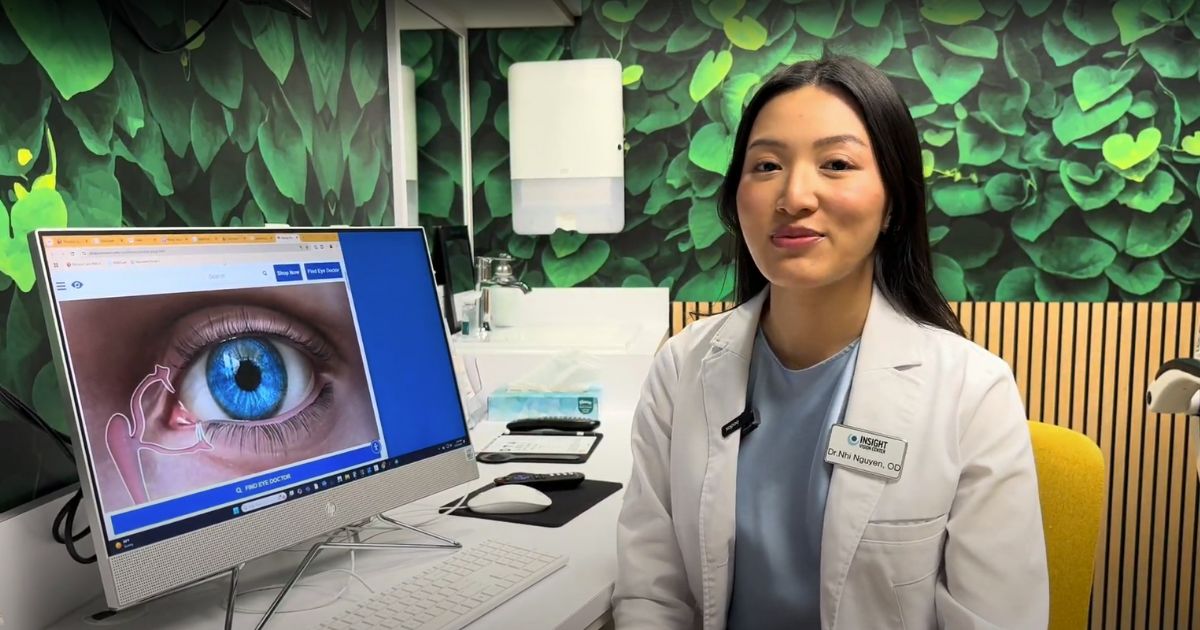
Ever felt like your eyes are drier than usual, but you can’t figure out why? Did you know that research indicates that women are 1.5 to 3 times more likely than men to experience dry eye syndrome! If you’re going through menopause, pregnancy, or taking birth control, your hormones might be the culprit. These shifts can mess with tear production, leaving your eyes irritated, gritty, or just downright uncomfortable.
How Hormones Affect Dry Eyes
Did you know your hormones play a big role in keeping your eyes comfortable? Estrogen, progesterone, and androgens (like testosterone) help control how well your eyes stay hydrated. Hormonal shifts from natural life stages like menopause or changes during your menstrual cycle, as well as conditions such as polycystic ovarian syndrome, thyroid disorders, or even variations in vitamin D levels, can all impact the quality and stability of your tear film. When these hormones fluctuate, it can throw off the balance of your tear film, leading to dryness, irritation, redness, and even blurry vision.

Androgens, in particular, are key to healthy tears. While many people focus on estrogen changes—especially during menopause—low androgen levels can cause problems, too. They help keep your meibomian glands working properly, and when there aren’t enough androgens, these glands don’t produce the oils needed to prevent tears from evaporating too quickly. That’s why some people with hormonal imbalances end up with persistent dry eyes, even if their estrogen levels seem fine.
It’s also about balance, not just hormone levels. The ratio of estrogen to androgens matters, which is why some women struggle with dry eyes even when their hormone levels look “normal” on paper. If you’ve ever wondered why your eyes feel so dry, your hormones could be part of the answer.
Birth Control and Dry Eyes: What You Need to Know
Ever feel like your eyes are constantly dry and irritated, and you’re not sure why? If you’re on birth control, that could be part of the reason. Recent research has found that some types of hormonal contraceptives—especially those containing estrogen—may increase the risk of dry eye symptoms like redness, grittiness, and even eyelid inflammation (blepharitis). The more types of birth control a woman has used, the higher the chance of experiencing these issues.
But here’s the good news: another study found that a special eye drop combining hyaluronic acid and galacto-xyloglucan helped improve dry eye symptoms in women taking oral contraceptives. This formula works by strengthening the tear film and keeping the eyes hydrated for longer.


Hormone Replacement Therapy (HRT) and Dry Eyes: What You Should Know
Thinking about hormone replacement therapy (HRT) or already on it? It’s important to know that while HRT helps with menopause symptoms, it can also affect your eyes. Research from the Women’s Health Study found that women on estrogen-only therapy had a 69% higher risk of developing dry eye, while those taking estrogen with progesterone saw a 29% increase in risk. Some women find that HRT actually improves their dry eye symptoms, but for others, it makes things worse—especially if estrogen levels go up without the right balance of other hormones. If you’re noticing more dryness, irritation, or blurry vision since starting HRT, don’t just brush it off.
When Does Dry Eye Syndrome Occur in Women?
Dry eye syndrome can develop at any stage of life, but it is particularly prevalent in women over 50. Hormonal changes associated with aging often lead to a reduction in tear production and alterations in tear composition, increasing the likelihood of dry eye symptoms. However, younger women may also experience dry eye, especially those who wear contact lenses or have undergone eye surgery.
Several factors can contribute to dry eye syndrome in women, including:
Recognizing these risk factors can help women take proactive steps to manage and prevent dry eye symptoms.


Common Symptoms of Dry Eye Syndrome in Women

Dry eye syndrome presents differently for each individual, with symptoms ranging from mild discomfort to more severe, persistent irritation. Women experiencing dry eye may notice one or more of the following:
- Dryness or Grittiness
- Eye redness and irritation
- Blurry vision
- Sensitivity to light
- Excessive tearing (a response to dryness)
- Eye fatigue
- Eye discomfort
- Eye infections

Orange County’s Top-Rated Specialty Eye Care Center – Relief for Dry Eyes Starts Here
Hormonal changes can throw your body off balance—and your eyes often feel the effects first. If you’re dealing with persistent dryness, irritation, or blurry vision, you don’t have to suffer in silence. At Insight Vision Center Optometry, we specialize in advanced dry eye treatments tailored to your unique needs, helping patients in Irvine, Costa Mesa, Newport Beach, and the surrounding Orange County area find lasting relief.
Our expert team, backed by top-rated patient reviews, takes a compassionate, science-driven approach to diagnosing and treating dry eye, whether it’s linked to hormonal shifts, aging, or environmental factors. Your vision and comfort matter to us, and we’re here to restore both.
Why wait? Schedule your appointment today and take the first step toward healthier, more comfortable eyes. Let’s work together to keep your vision clear and your eyes feeling their best!
Call us at (714) 942-1361 to book your appointment, or schedule online.





